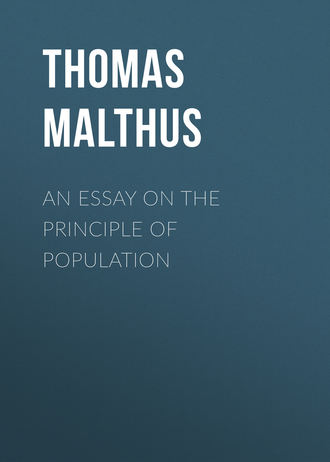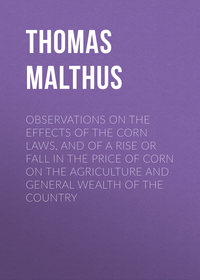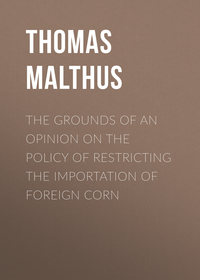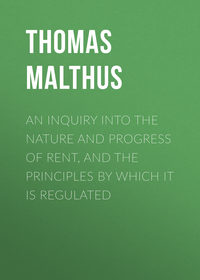 полная версия
полная версияAn Essay on the Principle of Population
In New Jersey, the proportion of births to deaths on an average of seven years, ending in 1743, was as 300 to 100. In France and England, taking the highest proportion, it is as 117 to 100. Great and astonishing as this difference is, we ought not to be so wonder-struck at it as to attribute it to the miraculous interposition of heaven. The causes of it are not remote, latent and mysterious; but near us, round about us, and open to the investigation of every inquiring mind. It accords with the most liberal spirit of philosophy to suppose that not a stone can fall, or a plant rise, without the immediate agency of divine power. But we know from experience that these operations of what we call nature have been conducted almost invariably according to fixed laws. And since the world began, the causes of population and depopulation have probably been as constant as any of the laws of nature with which we are acquainted.
The passion between the sexes has appeared in every age to be so nearly the same that it may always be considered, in algebraic language, as a given quantity. The great law of necessity which prevents population from increasing in any country beyond the food which it can either produce or acquire, is a law so open to our view, so obvious and evident to our understandings, and so completely confirmed by the experience of every age, that we cannot for a moment doubt it. The different modes which nature takes to prevent or repress a redundant population do not appear, indeed, to us so certain and regular, but though we cannot always predict the mode we may with certainty predict the fact. If the proportion of births to deaths for a few years indicate an increase of numbers much beyond the proportional increased or acquired produce of the country, we may be perfectly certain that unless an emigration takes place, the deaths will shortly exceed the births; and that the increase that had taken place for a few years cannot be the real average increase of the population of the country. Were there no other depopulating causes, every country would, without doubt, be subject to periodical pestilences or famine.
The only true criterion of a real and permanent increase in the population of any country is the increase of the means of subsistence. But even, this criterion is subject to some slight variations which are, however, completely open to our view and observations. In some countries population appears to have been forced, that is, the people have been habituated by degrees to live almost upon the smallest possible quantity of food. There must have been periods in such counties when population increased permanently, without an increase in the means of subsistence. China seems to answer to this description. If the accounts we have of it are to be trusted, the lower classes of people are in the habit of living almost upon the smallest possible quantity of food and are glad to get any putrid offals that European labourers would rather starve than eat. The law in China which permits parents to expose their children has tended principally thus to force the population. A nation in this state must necessarily be subject to famines. Where a country is so populous in proportion to the means of subsistence that the average produce of it is but barely sufficient to support the lives of the inhabitants, any deficiency from the badness of seasons must be fatal. It is probable that the very frugal manner in which the Gentoos are in the habit of living contributes in some degree to the famines of Indostan.
In America, where the reward of labour is at present so liberal, the lower classes might retrench very considerably in a year of scarcity without materially distressing themselves. A famine therefore seems to be almost impossible. It may be expected that in the progress of the population of America, the labourers will in time be much less liberally rewarded. The numbers will in this case permanently increase without a proportional increase in the means of subsistence.
In the different states of Europe there must be some variations in the proportion between the number of inhabitants and the quantity of food consumed, arising from the different habits of living that prevail in each state. The labourers of the South of England are so accustomed to eat fine wheaten bread that they will suffer themselves to be half starved before they will submit to live like the Scotch peasants. They might perhaps in time, by the constant operation of the hard law of necessity, be reduced to live even like the Lower Chinese, and the country would then, with the same quantity of food, support a greater population. But to effect this must always be a most difficult, and, every friend to humanity will hope, an abortive attempt. Nothing is so common as to hear of encouragements that ought to be given to population. If the tendency of mankind to increase be so great as I have represented it to be, it may appear strange that this increase does not come when it is thus repeatedly called for. The true reason is that the demand for a greater population is made without preparing the funds necessary to support it. Increase the demand for agricultural labour by promoting cultivation, and with it consequently increase the produce of the country, and ameliorate the condition of the labourer, and no apprehensions whatever need be entertained of the proportional increase of population. An attempt to effect this purpose in any other way is vicious, cruel, and tyrannical, and in any state of tolerable freedom cannot therefore succeed. It may appear to be the interest of the rulers, and the rich of a state, to force population, and thereby lower the price of labour, and consequently the expense of fleets and armies, and the cost of manufactures for foreign sale; but every attempt of the kind should be carefully watched and strenuously resisted by the friends of the poor, particularly when it comes under the deceitful garb of benevolence, and is likely, on that account, to be cheerfully and cordially received by the common people.
I entirely acquit Mr Pitt of any sinister intention in that clause of his Poor Bill which allows a shilling a week to every labourer for each child he has above three. I confess, that before the bill was brought into Parliament, and for some time after, I thought that such a regulation would be highly beneficial, but further reflection on the subject has convinced me that if its object be to better the condition of the poor, it is calculated to defeat the very purpose which it has in view. It has no tendency that I can discover to increase the produce of the country, and if it tend to increase the population, without increasing the produce, the necessary and inevitable consequence appears to be that the same produce must be divided among a greater number, and consequently that a day's labour will purchase a smaller quantity of provisions, and the poor therefore in general must be more distressed.
I have mentioned some cases where population may permanently increase without a proportional increase in the means of subsistence. But it is evident that the variation in different states, between the food and the numbers supported by it, is restricted to a limit beyond which it cannot pass. In every country, the population of which is not absolutely decreasing, the food must be necessarily sufficient to support, and to continue, the race of labourers.
Other circumstances being the same, it may be affirmed that countries are populous according to the quantity of human food which they produce, and happy according to the liberality with which that food is divided, or the quantity which a day's labour will purchase. Corn countries are more populous than pasture countries, and rice countries more populous than corn countries. The lands in England are not suited to rice, but they would all bear potatoes; and Dr Adam Smith observes that if potatoes were to become the favourite vegetable food of the common people, and if the same quantity of land was employed in their culture as is now employed in the culture of corn, the country would be able to support a much greater population, and would consequently in a very short time have it.
The happiness of a country does not depend, absolutely, upon its poverty or its riches, upon its youth or its age, upon its being thinly or fully inhabited, but upon the rapidity with which it is increasing, upon the degree in which the yearly increase of food approaches to the yearly increase of an unrestricted population. This approximation is always the nearest in new colonies, where the knowledge and industry of an old state operate on the fertile unappropriated land of a new one. In other cases, the youth or the age of a state is not in this respect of very great importance. It is probable that the food of Great Britain is divided in as great plenty to the inhabitants, at the present period, as it was two thousand, three thousand, or four thousand years ago. And there is reason to believe that the poor and thinly inhabited tracts of the Scotch Highlands are as much distressed by an overcharged population as the rich and populous province of Flanders.
Were a country never to be overrun by a people more advanced in arts, but left to its own natural progress in civilization; from the time that its produce might be considered as an unit, to the time that it might be considered as a million, during the lapse of many hundred years, there would not be a single period when the mass of the people could be said to be free from distress, either directly or indirectly, for want of food. In every state in Europe, since we have first had accounts of it, millions and millions of human existences have been repressed from this simple cause; though perhaps in some of these states an absolute famine has never been known.
Famine seems to be the last, the most dreadful resource of nature. The power of population is so superior to the power in the earth to produce subsistence for man, that premature death must in some shape or other visit the human race. The vices of mankind are active and able ministers of depopulation. They are the precursors in the great army of destruction; and often finish the dreadful work themselves. But should they fail in this war of extermination, sickly seasons, epidemics, pestilence, and plague, advance in terrific array, and sweep off their thousands and ten thousands. Should success be still incomplete, gigantic inevitable famine stalks in the rear, and with one mighty blow levels the population with the food of the world.
Must it not then be acknowledged by an attentive examiner of the histories of mankind, that in every age and in every state in which man has existed, or does now exist.
That the increase of population is necessarily limited by the means of subsistence.
That population does invariably increase when the means of subsistence increase. And that the superior power of population it repressed, and the actual population kept equal to the means of subsistence, by misery and vice?
CHAPTER 8
Mr Wallace—Error of supposing that the difficulty arising from population is at a great distance—Mr Condorcet's sketch of the progress of the human mind—Period when the oscillation, mentioned by Mr Condorcet, ought to be applied to the human race.
To a person who draws the preceding obvious inferences, from a view of the past and present state of mankind, it cannot but be a matter of astonishment that all the writers on the perfectibility of man and of society who have noticed the argument of an overcharged population, treat it always very slightly and invariably represent the difficulties arising from it as at a great and almost immeasurable distance. Even Mr Wallace, who thought the argument itself of so much weight as to destroy his whole system of equality, did not seem to be aware that any difficulty would occur from this cause till the whole earth had been cultivated like a garden and was incapable of any further increase of produce. Were this really the case, and were a beautiful system of equality in other respects practicable, I cannot think that our ardour in the pursuit of such a scheme ought to be damped by the contemplation of so remote a difficulty. An event at such a distance might fairly be left to providence, but the truth is that if the view of the argument given in this Essay be just the difficulty, so far from being remote, would be imminent and immediate. At every period during the progress of cultivation, from the present moment to the time when the whole earth was become like a garden, the distress for want of food would be constantly pressing on all mankind, if they were equal. Though the produce of the earth might be increasing every year, population would be increasing much faster, and the redundancy must necessarily be repressed by the periodical or constant action of misery or vice.
Mr Condorcet's Esquisse d'un Tableau Historique des Progres de l'Esprit Humain, was written, it is said, under the pressure of that cruel proscription which terminated in his death. If he had no hopes of its being seen during his life and of its interesting France in his favour, it is a singular instance of the attachment of a man to principles, which every day's experience was so fatally for himself contradicting. To see the human mind in one of the most enlightened nations of the world, and after a lapse of some thousand years, debased by such a fermentation of disgusting passions, of fear, cruelty, malice, revenge, ambition, madness, and folly as would have disgraced the most savage nation in the most barbarous age must have been such a tremendous shock to his ideas of the necessary and inevitable progress of the human mind that nothing but the firmest conviction of the truth of his principles, in spite of all appearances, could have withstood.
This posthumous publication is only a sketch of a much larger work, which he proposed should be executed. It necessarily, therefore, wants that detail and application which can alone prove the truth of any theory. A few observations will be sufficient to shew how completely the theory is contradicted when it is applied to the real, and not to an imaginary, state of things.
In the last division of the work, which treats of the future progress of man towards perfection, he says, that comparing, in the different civilized nations of Europe, the actual population with the extent of territory, and observing their cultivation, their industry, their divisions of labour, and their means of subsistence, we shall see that it would be impossible to preserve the same means of subsistence, and, consequently, the same population, without a number of individuals who have no other means of supplying their wants than their industry. Having allowed the necessity of such a class of men, and adverting afterwards to the precarious revenue of those families that would depend so entirely on the life and health of their chief, he says, very justly: 'There exists then, a necessary cause of inequality, of dependence, and even of misery, which menaces, without ceasing, the most numerous and active class of our societies.' (To save time and long quotations, I shall here give the substance of some of Mr Condorcet's sentiments, and hope I shall not misrepresent them. But I refer the reader to the work itself, which will amuse, if it does not convince him.) The difficulty is just and well stated, and I am afraid that the mode by which he proposes it should be removed will be found inefficacious. By the application of calculations to the probabilities of life and the interest of money, he proposes that a fund should be established which should assure to the old an assistance, produced, in part, by their own former savings, and, in part, by the savings of individuals who in making the same sacrifice die before they reap the benefit of it. The same, or a similar fund, should give assistance to women and children who lose their husbands, or fathers, and afford a capital to those who were of an age to found a new family, sufficient for the proper development of their industry. These establishments, he observes, might be made in the name and under the protection of the society. Going still further, he says that, by the just application of calculations, means might be found of more completely preserving a state of equality, by preventing credit from being the exclusive privilege of great fortunes, and yet giving it a basis equally solid, and by rendering the progress of industry, and the activity of commerce, less dependent on great capitalists.
Such establishments and calculations may appear very promising upon paper, but when applied to real life they will be found to be absolutely nugatory. Mr Condorcet allows that a class of people which maintains itself entirely by industry is necessary to every state. Why does he allow this? No other reason can well be assigned than that he conceives that the labour necessary to procure subsistence for an extended population will not be performed without the goad of necessity. If by establishments of this kind of spur to industry be removed, if the idle and the negligent are placed upon the same footing with regard to their credit, and the future support of their wives and families, as the active and industrious, can we expect to see men exert that animated activity in bettering their condition which now forms the master spring of public prosperity? If an inquisition were to be established to examine the claims of each individual and to determine whether he had or had not exerted himself to the utmost, and to grant or refuse assistance accordingly, this would be little else than a repetition upon a larger scale of the English poor laws and would be completely destructive of the true principles of liberty and equality.
But independent of this great objection to these establishments, and supposing for a moment that they would give no check to productive industry, by far the greatest difficulty remains yet behind.
Were every man sure of a comfortable provision for his family, almost every man would have one, and were the rising generation free from the 'killing frost' of misery, population must rapidly increase. Of this Mr Condorcet seems to be fully aware himself, and after having described further improvements, he says:
But in this process of industry and happiness, each generation will be called to more extended enjoyments, and in consequence, by the physical constitution of the human frame, to an increase in the number of individuals. Must not there arrive a period then, when these laws, equally necessary, shall counteract each other? When the increase of the number of men surpassing their means of subsistence, the necessary result must be either a continual diminution of happiness and population, a movement truly retrograde, or, at least, a kind of oscillation between good and evil? In societies arrived at this term, will not this oscillation be a constantly subsisting cause of periodical misery? Will it not mark the limit when all further amelioration will become impossible, and point out that term to the perfectibility of the human race which it may reach in the course of ages, but can never pass?
He then adds,
There is no person who does not see how very distant such a period is from us, but shall we ever arrive at it? It is equally impossible to pronounce for or against the future realization of an event which cannot take place but at an era when the human race will have attained improvements, of which we can at present scarcely form a conception.
Mr Condorcet's picture of what may be expected to happen when the number of men shall surpass the means of their subsistence is justly drawn. The oscillation which he describes will certainly take place and will without doubt be a constantly subsisting cause of periodical misery. The only point in which I differ from Mr Condorcet with regard to this picture is the period when it may be applied to the human race. Mr Condorcet thinks that it cannot possibly be applicable but at an era extremely distant. If the proportion between the natural increase of population and food which I have given be in any degree near the truth, it will appear, on the contrary, that the period when the number of men surpass their means of subsistence has long since arrived, and that this necessity oscillation, this constantly subsisting cause of periodical misery, has existed ever since we have had any histories of mankind, does exist at present, and will for ever continue to exist, unless some decided change take place in the physical constitution of our nature.
Mr Condorcet, however, goes on to say that should the period, which he conceives to be so distant, ever arrive, the human race, and the advocates for the perfectibility of man, need not be alarmed at it. He then proceeds to remove the difficulty in a manner which I profess not to understand. Having observed, that the ridiculous prejudices of superstition would by that time have ceased to throw over morals a corrupt and degrading austerity, he alludes, either to a promiscuous concubinage, which would prevent breeding, or to something else as unnatural. To remove the difficulty in this way will, surely, in the opinion of most men, be to destroy that virtue and purity of manners, which the advocates of equality, and of the perfectibility of man, profess to be the end and object of their views.
CHAPTER 9
Mr Condorcet's conjecture concerning the organic perfectibility of man, and the indefinite prolongation of human life—Fallacy of the argument, which infers an unlimited progress from a partial improvement, the limit of which cannot be ascertained, illustrated in the breeding of animals, and the cultivation of plants.
The last question which Mr Condorcet proposes for examination is the organic perfectibility of man. He observes that if the proofs which have been already given and which, in their development will receive greater force in the work itself, are sufficient to establish the indefinite perfectibility of man upon the supposition of the same natural faculties and the same organization which he has at present, what will be the certainty, what the extent of our hope, if this organization, these natural faculties themselves, are susceptible of amelioration?
From the improvement of medicine, from the use of more wholesome food and habitations, from a manner of living which will improve the strength of the body by exercise without impairing it by excess, from the destruction of the two great causes of the degradation of man, misery, and too great riches, from the gradual removal of transmissible and contagious disorders by the improvement of physical knowledge, rendered more efficacious by the progress of reason and of social order, he infers that though man will not absolutely become immortal, yet that the duration between his birth and natural death will increase without ceasing, will have no assignable term, and may properly be expressed by the word 'indefinite'. He then defines this word to mean either a constant approach to an unlimited extent, without ever reaching it, or an increase. In the immensity of ages to an extent greater than any assignable quantity.
But surely the application of this term in either of these senses to the duration of human life is in the highest degree unphilosophical and totally unwarranted by any appearances in the laws of nature. Variations from different causes are essentially distinct from a regular and unretrograde increase. The average duration of human life will to a certain degree vary from healthy or unhealthy climates, from wholesome or unwholesome food, from virtuous or vicious manners, and other causes, but it may be fairly doubted whether there is really the smallest perceptible advance in the natural duration of human life since first we have had any authentic history of man. The prejudices of all ages have indeed been directly contrary to this supposition, and though I would not lay much stress upon these prejudices, they will in some measure tend to prove that there has been no marked advance in an opposite direction.
It may perhaps be said that the world is yet so young, so completely in its infancy, that it ought not to be expected that any difference should appear so soon.
If this be the case, there is at once an end of all human science. The whole train of reasonings from effects to causes will be destroyed. We may shut our eyes to the book of nature, as it will no longer be of any use to read it. The wildest and most improbable conjectures may be advanced with as much certainty as the most just and sublime theories, founded on careful and reiterated experiments. We may return again to the old mode of philosophising and make facts bend to systems, instead of establishing systems upon facts. The grand and consistent theory of Newton will be placed upon the same footing as the wild and eccentric hypotheses of Descartes. In short, if the laws of nature are thus fickle and inconstant, if it can be affirmed and be believed that they will change, when for ages and ages they have appeared immutable, the human mind will no longer have any incitements to inquiry, but must remain fixed in inactive torpor, or amuse itself only in bewildering dreams and extravagant fancies.





